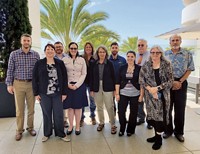Advertisement
Grab your lab coat. Let's get started
Welcome!
Welcome!
Create an account below to get 6 C&EN articles per month, receive newsletters and more - all free.
It seems this is your first time logging in online. Please enter the following information to continue.
As an ACS member you automatically get access to this site. All we need is few more details to create your reading experience.
Not you? Sign in with a different account.
Not you? Sign in with a different account.
ERROR 1
ERROR 1
ERROR 2
ERROR 2
ERROR 2
ERROR 2
ERROR 2
Password and Confirm password must match.
If you have an ACS member number, please enter it here so we can link this account to your membership. (optional)
ERROR 2
ACS values your privacy. By submitting your information, you are gaining access to C&EN and subscribing to our weekly newsletter. We use the information you provide to make your reading experience better, and we will never sell your data to third party members.
Comment
Supporting our chemical technical professionals
by Jennifer McCulley, Chair, Committee on Technician Affairs
August 11, 2019
| A version of this story appeared in
Volume 97, Issue 32

Did you know that the American Chemical Society has a committee focused on industrial and academic non-PhD chemical professionals? The Committee on Technician Affairs (CTA) aims to raise public awareness about the value of technicians to society, highlight the relevance of technicians to ACS, and highlight the relevance of ACS to technicians.
Chemical technicians were historically considered to be “a pair of hands” in the laboratory, primarily tasked with routine or less-specialized work. The highest degree that they obtained was often a high school diploma or perhaps an associate’s degree. Today’s chemical technical professionals typically possess BA, BS, or even MS degrees, and they play a vital role in academic, industry, government, and research laboratories.
As a chemical technical professional who spent many years as a bench chemist analyzing samples, I have felt firsthand the challenges of career development and of gaining recognition for our efforts. In my current role as a portfolio program manager at Agilent Technologies and an ACS local section leader for South Jersey, I am continually reminded of the important work performed by chemical technical professionals. I see their work when I attend networking events and conferences and when I visit chemical technical professionals in laboratories around the world.
Many of the stakeholders of CTA are not only unaware of the benefits of ACS membership, attending national meetings, and joining CTA, but they also don’t self-identify as a technician. Because of this disconnect, we produced two webinars to increase awareness of the committee and the resources available to the chemical technical professional: “Exploring Non-PhD Careers in Industrial Chemistry” and “Job Search Roadmap.”
During the webinar on exploring non-PhD careers, analytical chemists Elizabeth Diaz, Peter Otton, and David Geissler provided a “day in the life” perspective of a chemical technical professional. Bill Carroll, a past ACS president and former chair of the ACS Board of Directors, and ACS career consultant Joseph Martino III provided insights on career development during the “Job Search Roadmap” webinar. Both webinars are available on the CTA website www.acs.org/cta.
The Awards and Recognition Subcommittee has increased awareness of CTA by reinvigorating and promoting the various awards the committee provides. In 2018, the committee presented 14 ACS Chemical Technology Student Awards to top students who have finished 75% of their degrees and intend on joining the industrial workforce. In 2017, the committee presented only one of these awards. We have seen an increase in National Chemical Technician Award applicants from fewer than 8 to nearly 20 over the past few years. These awardees are recognized at a luncheon during the ACS national meeting each spring.
At the 2019 spring meeting in Orlando, Florida, we recognized Laura Nielsen, a chemical technical professional at Phillips 66, with the award. Laura has led the development of new synthetic pathways for the organic photovoltaic group. She developed an easily scalable procedure for making a new monomer, which led to a patent with her as lead inventor. She also contributed to the invention of two polymers for organic photovoltaic applications and provides coaching to all the technicians in the group in safe chemical handling, waste management, and appropriate use of lab equipment.
In 2018, CTA launched its Leadership Development System Course Award. The award covers the cost for two chemical technical professionals who live within 200 mi of the location of each national meeting to take an ACS Leadership Development System course at the meeting. The award not only provides a development opportunity for the individual but also provides an opportunity to experience attending an ACS national meeting. In addition, through a partnership with the Younger Chemists Committee, CTA provides multiple travel awards a year for up-and-coming leaders to receive training at the ACS Leadership Institute.
Our new Stakeholders Outreach Subcommittee was formed to better understand and define the makeup of the chemical technical professional community. Through this subcommittee, we hope to generate a list of the job titles and descriptions that our stakeholders have so that ACS may better serve them through sponsorships, webinars, awards, and other events. If you are interested or have stakeholders that fall under the purview of CTA, please let us know by emailing us at cta@acs.org.
In closing, I would like to share some thoughts from Carol Libby, CTA member and program chair: “One valuable aspect of participating in an ACS committee or local section is the opportunity to take on leadership roles that may not be available to you in your day job. The ACS has a phenomenal leadership development program that has benefits beyond ACS, like on the job and in your community.”
If you are interested in learning more about CTA or know stakeholders in your network who are, please join our LinkedIn group and follow us on Twitter @CTA_ACS.
Views expressed are those of the author and not necessarily those of C&EN or ACS.





Join the conversation
Contact the reporter
Submit a Letter to the Editor for publication
Engage with us on Twitter